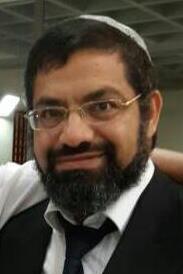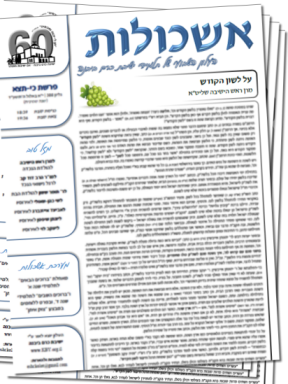The Golden Calf, the Red Heifer and the Tabernacle
By: Rav Mordechai Greenberg
Nasi Hayeshiva
This week's parsha deals with the construction of the mishkan (Tabernacle). It is striking that about each and every act, and about each and every detail, the Torah confirms that Bnei Yisrael did it, "as G-d had commanded Moshe." This is something significant!
The Midrash indicates in numerous places that the construction of the mishkan serves to atone for the sin of the golden calf:
"I am black" -- with the act of the [golden] calf; "and [I am] beautiful" -- with the construction of the mishkan. (Shemot Rabbah 49:2)
"The Tabernacle of Testimony" ... It is a testimony to all people that Israel is pardoned. (Shemot Rabbah 51:3)
G-d said to Israel: When you constructed the calf you angered Me with, "This is your god." Now that you have made the mishkan with "These," I am appeased with you, as it says, "These are the reckonings of the mishkan." (Shemot Rabbah 51:8)
R. Yehuda Halevi, in the Kuzari, explains that the sin of the golden calf was not actual idolatry, but rather it was only considered a sin relative to Israel's stature. To the contrary, for other nations it would have been considered a mitzvah, since they sought closeness to G-d, but did so based on intellectual reasoning and not based on Divine command. In the end, Moshe instructed them to construct golden cherubs, and the calf is no stranger that cherubs. However, they were commanded as the cherubs, and not about the calf. G-d chose Israel to demonstrate His Will, that He is above human wisdom and intelligence. Trying to be clever to add closeness to G-d through human ploys is unacceptable for Israel, and, in the end, some succumbed also to the sin of idolatry.
This is the significance of saying, na'aseh ("We will do"), before, nishma ("We will hear"). It is important to understand and comprehend deeply the mitzvot of the Torah, but only after fulfilling. Doing precedes hearing, and is not conditional on understanding.
R. Yehuda Halevi explains based on this Chazal's comment in the Midrash (Shemot Rabbah 41:1): "It was proper for our forefathers to accept the Torah and say, 'All that G-d said, we will do and we will hear.' Perhaps it was proper for them to say, 'This is your god, Israel?'" This comparison is shocking! How is it possible to compare two things so contradictory, which have nothing in common? Rather, saying na'aseh before nishma proved that they understood this principle, that mitzvot cannot be observed only based on understanding. In contrast, in the sin of the calf, Bnei Yisrael sinned by following their own intelligence and understanding, and they introduced a new mitzvah which G-d didn't contemplate. In any case, the common denominator is their desire for closeness to G-d.
The parah aduma (red heifer) also atones for the sin of the calf: "It is comparable to the son of a maid who dirtied the king's palace. The king said, "Let his mother come and wipe away the filth." (Bamidbar Rabbah 19:8) The heifer is a chukah (decree), about which King Shlomo, the wisest of all men, said: "I thought I could become wise; but it is beyond me." (Kohelet 7:23) From this mitzvah, Shlomo understood that even the other parts of the Torah, which he thought that he understood -- even they are above his comprehension. Therefore it says, "This is the decree of the Torah," (Bamidbar 19:2), that the entire Torah is a chukah. Thus, the heifer atones for the sin of the calf, in which they followed their own intelligence to introduce new mitzvot.
This is the reason why the Torah repeats so many times that Israel did "as Hashem had commanded Moshe," to indicate, that with this they fulfilled once again, na'aseh venishma, and they did everything based on the Divine command. Through this they rectified the sin of the calf, since they accepted upon themselves to do, "as Hashem had commanded," and not based on their own understanding.
It is possible that there is an additional element here. Usually, there is a gap between thought and action, between the abstract ideal and the practical application, and in the realization in practice there is a decline relative to the idea. Here, however, the Torah revealed that with the help of Bezalel, who knew, "to think thoughts, to do with the gold, silver and copper" (Shemot 31:4), the act matched the thought. There was no distance between the Divine command and the human doing, and everything that they did was, "as Hashem had commanded Moshe."
In a few days, many of our talmidim will go out "to join the ranks." (Bamidbar 4:23) Our prayer and blessing is that they will succeed to fulfill in practice all that they learned during their stay in the Yeshiva, and there will be no gap between the ideal and the practice. May they merit what Moshe said when "he saw the entire work, and behold! -- they had done it as Hashem had commanded, so they had done! And Moshe blessed them" (Shemot 39:43) -- He said to them: May it be [G-d's] will that the Divine Presence should dwell in your handiwork. "May the pleasantness of Hashem, our G-d, be upon us; our handiwork establish for us; our handiwork, establish it." (Tehillim 90:17) -- Rashi.
Shiur ID: 3715
Do you have a comment or question on the shiur?
Comment below and we'll join the discussion
Add your comments:

.jpg)




